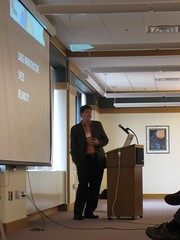
Ben discussed how all Google engineers are required to allocate 20 percent of their time working on any project idea of their choosing. The resulting "20 percent projects" will most often than not have nothing to do with Google's current core business (one engineer's project is to buy Iceland). Some may evolve into "Googlettes" and land up in Google Labs or discussed on the Google Blog. Google services such as Gmail and Google News started as 20 percent projects. (Ben pointed out that Mendel's discovery of generics was a 20% project).
The innovation culture at Google is all about coming up with an idea, getting it out there for people to use as quick as possible, and having it evolve quickly through iterative process. The cultural response to a new idea is brainstorming. Why an idea can't be done (such as buying Iceland) and inneroffice politics is rarely an issue. Their culture is one that reduces friction between idea and implementation.
This is in stark contrast to that which exists in many libraries. Our project and service ideas must be properly vetted through time intensive committee and administrative review. They must be reviewed over and over again, go through usability testing, and can only released when "complete." It is not that libraries can't innovate, but we trip over ourselves as we try to innovate with our desire for structure and process. We spend mush too much time coming up with reasons why we can't do something.
I suspect that the majority of Google's 20% projects are simply abandoned. They would be lucky if 2 out of 10 of them even work. Libraries on the other hand are very reluctant to abandon projects/services that do not work. Instead, we have a tendency to keep pumping more resources into them long after the project/service is useful. Our rationale is that we have put so much money into them already. This drains resources away from potential start up projects which may in the long run prove more beneficial to our customers.
Now, Google is certainly at a distinct advantage since as a new organization they could establish their culture from the start. Libraries have some interesting legacy sub-cultures to deal with which, well, I will leave it at that. Still, we have a lot to learn from Google's culture and the success it breeds.
Photo copyright 2007 by CIC Library 07 Sphere: Related Content




No comments:
Post a Comment